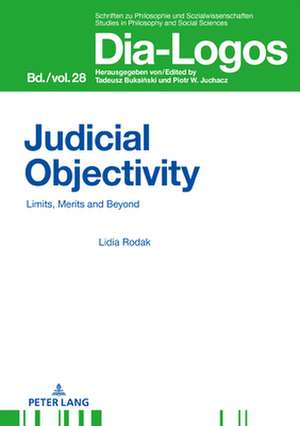Judicial Objectivity: Dia-Logos
Autor Lidia Rodaken Limba Engleză Hardback – 26 ian 2021
Din seria Dia-Logos
-
 Preț: 368.60 lei
Preț: 368.60 lei -
 Preț: 517.53 lei
Preț: 517.53 lei - 23%
 Preț: 451.25 lei
Preț: 451.25 lei - 23%
 Preț: 456.40 lei
Preț: 456.40 lei -
 Preț: 422.63 lei
Preț: 422.63 lei -
 Preț: 456.48 lei
Preț: 456.48 lei -
 Preț: 463.08 lei
Preț: 463.08 lei - 8%
 Preț: 541.14 lei
Preț: 541.14 lei - 23%
 Preț: 484.10 lei
Preț: 484.10 lei - 23%
 Preț: 600.67 lei
Preț: 600.67 lei - 23%
 Preț: 516.59 lei
Preț: 516.59 lei - 23%
 Preț: 570.57 lei
Preț: 570.57 lei - 23%
 Preț: 467.47 lei
Preț: 467.47 lei - 23%
 Preț: 553.67 lei
Preț: 553.67 lei - 23%
 Preț: 463.33 lei
Preț: 463.33 lei - 20%
 Preț: 459.14 lei
Preț: 459.14 lei - 20%
 Preț: 466.88 lei
Preț: 466.88 lei
Preț: 464.05 lei
Nou
Puncte Express: 696
Preț estimativ în valută:
88.80€ • 92.94$ • 73.91£
88.80€ • 92.94$ • 73.91£
Carte tipărită la comandă
Livrare economică 31 martie-14 aprilie
Preluare comenzi: 021 569.72.76
Specificații
ISBN-13: 9783631652145
ISBN-10: 3631652143
Pagini: 198
Dimensiuni: 148 x 210 mm
Greutate: 0.43 kg
Editura: Peter Lang Copyright AG
Seria Dia-Logos
ISBN-10: 3631652143
Pagini: 198
Dimensiuni: 148 x 210 mm
Greutate: 0.43 kg
Editura: Peter Lang Copyright AG
Seria Dia-Logos
Notă biografică
Lidia Rodak is a Lecturer of Sociology and Philosophy of Law at the University of Silesia in Katowice, Poland. Her main research interests are objectivity and subjectivity in the socio-legal discourse and feminist jurisprudence. She published her works in The Hague Journal on the Rule of Law, Oñati Socio-Legal Series, Studi sulla Questione Criminale, and Peter Lang.
Cuprins
objectivity - legal objectivity - critical discourse analysis - judicial discourse - intersubjectivity - Polish jurisprudence
Descriere
The book discusses how "objectivity" is used in the judicial discourse. Through critical discourse analysis of Polish jurisprudence, the book presents a taxonomy of the objectivity's uses by judges, highlighting that objectivity has a special meaning in the legal discourse based on legal authority.
